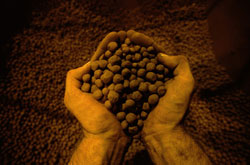Towards quality assurance standards for solid biofuels
The existing potential of biomass as a renewable energy source can contribute substantially in preserving the natural environment in the years to come as well as in developing rural areas. To strengthen the market penetration of technologies that use renewable energy sources, "market rules" is a main prerequisite. Such standards are needed to ensure well-defined properties and quality of the biofuels to be traded and handled as an energy carrier. Within this background the currently ongoing European standardisation process develops such "market rules" of the overall provision chain of solid biofuels. The goal of the EU funded BioNorm project is to develop standards for sampling work as well as for testing methods of physical-mechanical fuel characteristics. In this way it aims to provide proof if the defined key properties are met. German-based project partner, TFZ-Technologie-und Förderzentrum Nachwachsende Rohstoffe focused on the assessment of the most efficient methodologies applied for the standardisation of solid biofuel properties. In view of different process steps, from handling to transportation and end-conversion processes, the knowledge of the durability of refined biomass fuels and its particle density as well as its ash melting behaviour are of importance in the product specifications. For this purpose different procedure applied on densified solid biofuels has been tested on an element-by-element basis and in view of the accuracy in defining the fuel's physical quality. The next step is to optimise and validate the most promising methods, based on the outcome of the investigations. As part of a broader framework, best practise guidelines for the provision of solid biofuels with a defined fuel quality will form the basis to support the compilation of a respective standard.







